Vaccination Week Observed in St. Kitts and Nevis and Throughout the Americas
Vaccination Week in the Americas (VWA) 2025, themed “Your decision makes a difference. Immunization for all,” underscores the critical role of equitable vaccine access for safeguarding public health, particularly among vulnerable populations. This annual initiative serves as a timely reminder of the ongoing struggle against vaccine-preventable diseases and the importance of maintaining high immunization coverage to protect individuals and communities. The focus on equity and access highlights the need to address disparities in vaccine uptake and ensure that everyone has the opportunity to benefit from the protection vaccines offer, regardless of their socioeconomic status, geographic location, or other factors.
The 2025 VWA comes on the heels of a concerning resurgence of measles in the Americas. Despite having achieved measles elimination status in 2016, the region faced a setback in 2024 with an increase in reported cases. This prompted the Pan American Health Organization (PAHO) to issue an epidemiological alert, emphasizing the need for renewed vigilance and strengthened immunization efforts. The resurgence highlights the fragility of elimination status and underscores the importance of maintaining consistently high vaccination rates to prevent the re-establishment of endemic transmission. The importation of the virus from outside the region further emphasizes the interconnectedness of global health and the need for international collaboration in disease prevention and control.
In response to the rising measles cases and the overarching goals of VWA 2025, the Ministry of Health has launched a comprehensive immunization campaign. This campaign aims to promote the full spectrum of available vaccines, ensuring that individuals are aware of the protection offered and can access the vaccines they need. This proactive approach reflects a commitment to strengthening the population’s immunity and preventing a wider outbreak of measles and other vaccine-preventable diseases. The campaign reinforces the crucial message that vaccination is not only an individual choice but a collective responsibility that contributes to the health and well-being of the entire community.
The campaign is placing particular emphasis on three key vaccines: the Human Papillomavirus (HPV) vaccine, the influenza vaccine, and the measles-mumps-rubella (MMR) vaccine. The HPV vaccine, Gardasil, protects against several strains of HPV that cause cervical cancer, offering a crucial preventative measure against this prevalent and often devastating disease. Promoting HPV vaccination is vital for reducing the burden of cervical cancer, particularly in adult women who may not have had access to the vaccine earlier in life. The influenza vaccine is crucial for protecting against seasonal influenza, a highly contagious respiratory illness that can lead to serious complications, especially in vulnerable populations such as the elderly and young children. Promoting annual influenza vaccination remains a cornerstone of public health efforts to mitigate the impact of seasonal influenza outbreaks.
The MMR vaccine, of course, plays a central role in preventing measles, mumps, and rubella. Given the recent resurgence of measles cases, emphasizing MMR vaccination is critical for controlling the current outbreak and preventing future outbreaks. Ensuring high MMR vaccination coverage is particularly important for protecting children, who are most vulnerable to measles complications. The campaign’s focus on the MMR vaccine underscores the importance of catching up on missed vaccinations and maintaining recommended immunization schedules to protect against these highly contagious and potentially serious diseases.
Furthermore, the Ministry of Health is advising individuals planning to travel, especially to destinations like the USA, Canada, and Mexico, to review their vaccination status. These countries have experienced continued measles circulation, posing a risk to unvaccinated or inadequately vaccinated travelers. This travel advisory highlights the importance of pre-travel health consultations and ensuring up-to-date vaccinations to protect oneself and prevent the importation of measles and other vaccine-preventable diseases. The recommendation to verify vaccination status before travel underscores the ongoing threat of measles and the need for sustained vigilance and proactive measures to prevent its spread. This advice also serves as a reminder that maintaining high vaccination coverage is not only essential for individual protection but also crucial for preventing the global spread of infectious diseases.
Share this content:












Post Comment